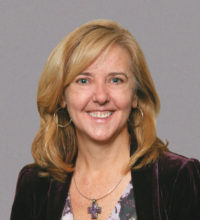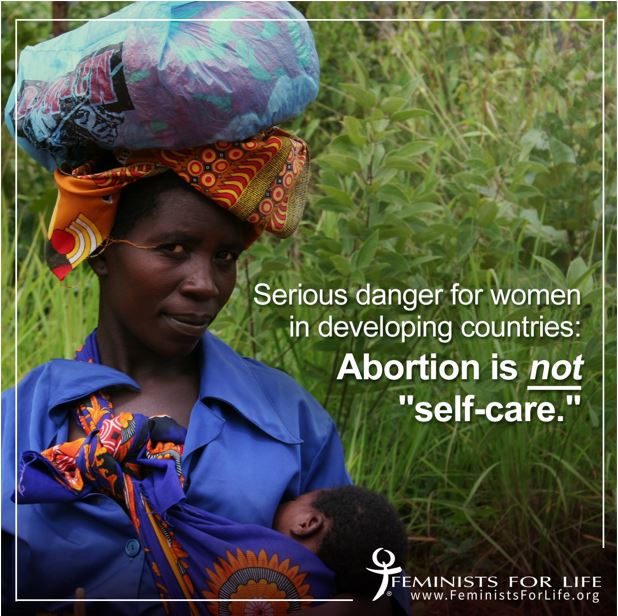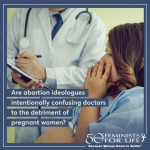In response to the World Health Organization’s release earlier this summer of updated “self-care” guidelines recommending the self-administration of abortion-inducing drugs without the direct supervision of a doctor, we asked for input from Dr. Ingrid Skop. In this exclusive statement released to FFL, she explains what is going on internationally and the implications for women’s health in areas around the world in greatest need of resources and support — and how WHO and abortion advocates work in concert to exploit these vulnerable populations.
Sensitive readers be aware.
For years, WHO and other international abortion advocacy organizations have pressured countries to repeal their abortion laws for the stated purpose of “making abortion safer for women.” They claimed that tens of thousands of women died yearly from illegal abortions, and millions suffered long-term complications. Yet, now, they have advanced medically unsupported recommendations that women in countries where abortion is restricted “self-manage” their abortions without medical supervision.
WHO’s recommended regimen consists of a combination of two medications: mifepristone, which blocks hormonal support, causing fetal death, and misoprostol, which causes uterine contractions to evacuate the tissue. It doesn’t always work, and if the tissue is not completely expressed, hemorrhage and infection may result, and surgical D&C is usually required to remove the remaining tissue. Medical abortion complication data in the U.S. is incomplete and studies are often biased, but better quality international records-linkage studies and meta-analyses demonstrate failures requiring surgery 3 to 10% of the time. Impoverished women in developing countries with poor quality medical systems and limited blood banking are likely to suffer disproportionately when these complications occur.

Further, WHO recommends that women consume these medications without prior evaluation by a health care provider. This can lead to additional serious complications. If a woman underestimates her gestational age, the risk of failure is much higher, with as many as 40% requiring surgery if medical abortion is attempted in the second trimester instead of the first. Failure to confirm an intrauterine location of the pregnancy can lead to catastrophic internal bleeding, because this regimen does not work on a pregnancy that has become lodged in a fallopian tube, which can rupture, sometimes resulting in maternal death. Failure to document Rh status by labs, and give a preventative RhoGAM shot if indicated, may cause a woman to form an immune response to future pregnancies, resulting in death or severe brain damage to future children. Additionally, widely promoting information on obtaining medical abortion pills will allow others, such as sex traffickers, incestuous abusers, and coercive partners, to obtain and provide these pills to women who may not desire to end their pregnancies.
Clearly, these recommendations by WHO are not in the best interests of women, as they will likely lead to severe injuries and deaths in areas of the world where health care is limited and not easily accessible. WHO and its pro-abortion colleagues have demonstrated that their goal is not the safety of women in crisis, but primarily the termination of human life for eugenic and population control reasons.
Ingrid Pfanstiel Skop, M.D., attended Oklahoma State University and the Washington University School of Medicine, and she trained in obstetrics and gynecology at the University of Texas Health Science Center in San Antonio. She has been caring for women and delivering babies for 25 years in San Antonio. Dr. Skop is married to Brian, a psychiatrist, and has three children: Ian, Eli, and Sophie.








